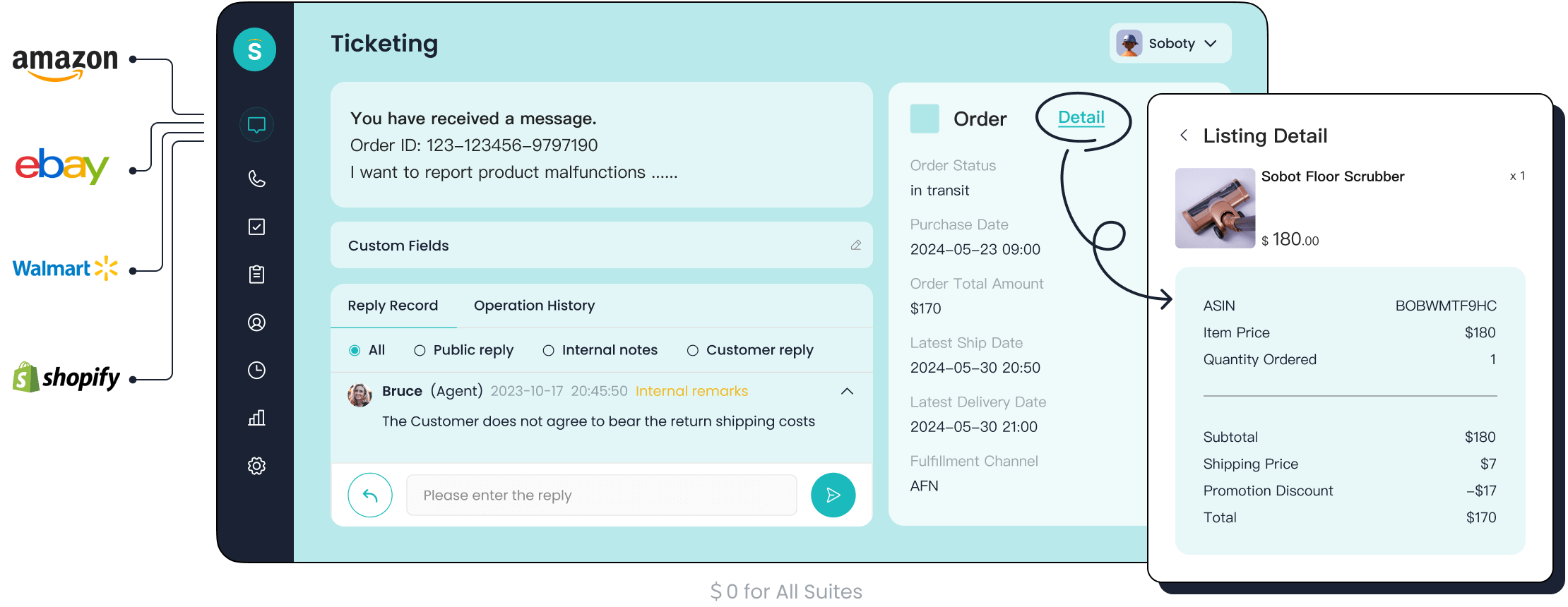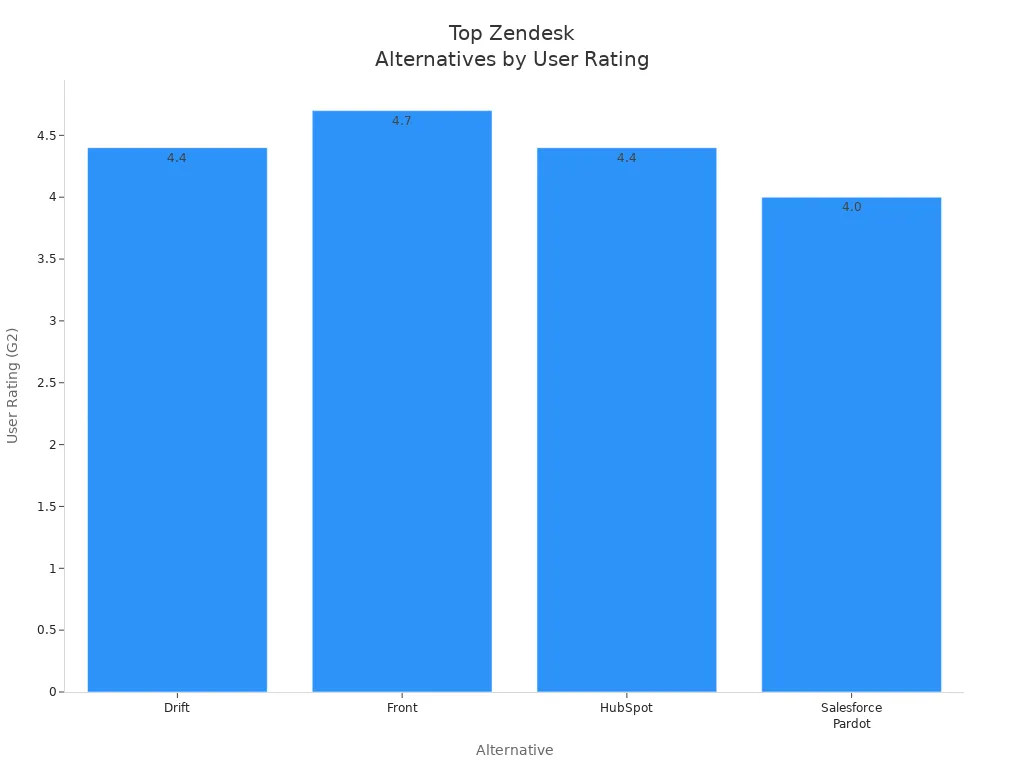Tools Like Zendesk Are They Better Than Freshdesk

Selecting the right customer service software can make or break customer satisfaction. Tools like Zendesk and Freshdesk both offer advanced features, but no single helpdesk fits every business. Companies that use powerful customer support software, such as Sobot AI or Sobot call center, see higher satisfaction rates. About 80% of customers switch brands after poor service, and 61% want fast resolutions. Effective tools like Zendesk, Freshdesk, and Sobot help teams deliver the best helpdesk experiences across industries.
Freshdesk vs Zendesk

Key Differences
When comparing freshdesk vs zendesk, businesses often look for clear differences in features, usability, and scalability. Both platforms serve as leading helpdesk solutions, but their approaches and strengths vary. The following table summarizes the most significant feature differences between freshdesk and zendesk, based on recent user reviews and industry analysis:
| Feature | Freshdesk Highlights | Zendesk Highlights |
|---|---|---|
| AI/Automation | Freddy AI bot, scenario automation | Zendesk Answer Bot, advanced automation for ticket handling |
| Knowledge Base | Available on all plans, multilingual support on higher plans | Available on higher plans, AI-powered search |
| Integrations | CRM, e-commerce, productivity tools, marketplace | Extensive marketplace, CRM, e-commerce, productivity tools |
| Free Trial | 21-day free trial | 14-day free trial |
| Scalability | Suited for small to medium businesses | Highly scalable, designed for enterprises |
| Reporting & Analytics | Advanced reporting, customizable dashboards | Comprehensive reporting, custom report creation, AI-driven insights |
| Customization | Custom ticket views, workflows | Extensive customization of workflows and agent spaces, developer tools |
| User Experience | Feature-rich but can be complex for new users | Easy to use, ideal for small to mid-sized businesses |
| Support | 24/7 support, premium options costly | Good support but slower on lower plans |
| Limitations | Complex setup for advanced features, slower with high ticket volume | Subscription restrictions, slow support response, export bugs |
Freshdesk vs zendesk comparisons often highlight how each platform addresses the needs of different business sizes. Freshdesk appeals to small and medium businesses with its user-friendly interface and affordable pricing. Zendesk, on the other hand, attracts larger enterprises that require advanced customization, deeper integrations, and robust analytics.
Tip: Companies looking for a unified platform with strong automation and omnichannel capabilities may also consider Sobot. Sobot’s ticketing system and omnichannel solution offer seamless integration with e-commerce and CRM platforms, making it a flexible choice for growing businesses.
In terms of user adoption, zendesk leads the market with a much higher number of user reviews and a larger customer base. Zendesk receives more engagement and positive feedback, especially from enterprises that need advanced features and scalability. Freshdesk, while popular among SMBs, has fewer reviews and a slightly lower average rating.
| Platform | Number of User Reviews | Average Rating | Positive Reviews | Neutral Reviews | Negative Reviews |
|---|---|---|---|---|---|
| Zendesk | 422 | 1.58 | High | Some | Many |
| Freshdesk | 12 | 1.42 | Few | None | Mostly negative |
The freshdesk vs zendesk debate often centers on which platform delivers the best helpdesk experience for a specific business type. Zendesk for service stands out for its robust analytics, advanced automation, and ability to handle high ticket volumes across multiple channels. Freshdesk, meanwhile, offers a more approachable setup and strong security features, such as two-factor authentication and SSL encryption.
Strengths and Weaknesses
Understanding the strengths and weaknesses of freshdesk vs zendesk helps businesses make informed decisions. Each platform brings unique advantages and some limitations, depending on the use case.
Zendesk Strengths
- User-friendly interface that simplifies onboarding for new agents.
- Extensive integration capabilities with over 700 third-party applications.
- Robust platform with strong brand recognition and a large partner ecosystem.
- Continuous innovation, including AI-powered Answer Bot and customer sentiment analysis.
- Omnichannel support, consolidating customer interactions across phone, email, chat, and social media.
- Customizable dashboards and advanced reporting through Zendesk Explore.
- Scalability for large enterprises and complex workflows.
- Compliance with global data privacy regulations.
- Fast implementation for most organizations, with average setup times ranging from 6 to 9 weeks for mid-sized companies.
Zendesk’s strengths make it a preferred choice for enterprises that need a scalable helpdesk with deep customization and analytics. Its open architecture allows developers to build custom solutions, and its predictable per-seat licensing helps manage costs.
Zendesk Weaknesses
- Higher cost, especially for advanced features and enterprise plans.
- Subscription restrictions and slow support response times on lower-tier plans.
- Occasional export bugs and complexity for smaller teams.
- Some users report that the platform can be overwhelming for those without technical expertise.
Freshdesk Strengths
- More affordable pricing, with free tiers and lower-cost plans for small businesses.
- User-friendly interface and easier setup, ideal for SMBs.
- Strong security features, including two-factor authentication and SSL encryption.
- Collaboration tools that enable agents to work together on tickets.
- Robust ticketing system with prioritization, SLA management, and AI automation.
- Help widget for embedding support directly on websites or blogs.
- Multilingual support, beneficial for businesses with diverse customer bases.
- Personalized customer support focused on smaller companies.
Freshdesk vs zendesk comparisons often show that freshdesk excels in simplicity and cost-effectiveness. Many small businesses choose freshdesk for its approachable design and lower barrier to entry.
Freshdesk Weaknesses
- Customer support response times can be inconsistent, especially on lower-tier plans.
- Advanced reporting and analytics features are limited on basic plans, often requiring upgrades.
- The mobile app lacks some functionalities compared to the desktop version.
- Advanced customizations can be complex to implement without technical skills.
- Occasional system glitches and lags have been reported.
- Pricing gaps between subscription plans may cause concerns about value for advanced features.
Note: While freshdesk and zendesk dominate the helpdesk market, alternatives like Sobot offer unified ticket management, AI-powered automation, and omnichannel support. Sobot’s platform integrates with email, voicemail, chat, and e-commerce systems, providing a seamless experience for both agents and customers. Businesses seeking a flexible and scalable solution can explore Sobot’s offerings for a modern approach to customer support.
Freshdesk vs. Zendesk: Which Is Better?
The freshdesk vs zendesk debate does not have a one-size-fits-all answer. Zendesk suits enterprises that need advanced analytics, deep integrations, and high scalability. Freshdesk works best for small to medium businesses that value affordability, ease of use, and strong security. Both platforms offer robust ticket management and automation, but their strengths align with different business needs.
For organizations that want to unify sales, marketing, and support, Sobot provides an all-in-one contact center solution. Sobot’s ticketing system automates workflows, manages SLAs, and supports multilingual customer support, making it a strong contender for businesses seeking efficiency and growth.
Companies should evaluate their current and future needs, considering factors like scalability, integration, and total cost of ownership. Exploring free trials and consulting with vendors can help identify the best helpdesk for each unique situation.
Tools Like Zendesk: Top Alternatives
Sobot Ticketing System

Many businesses searching for tools like zendesk want a solution that unifies customer interactions and streamlines support. Sobot stands out in the support ticketing space with its all-in-one platform. Companies use Sobot to manage chat, email, voicemail, and even e-commerce inquiries from a single dashboard. This unified approach helps agents respond faster and reduces confusion.
Sobot’s ticketing systems automate repetitive tasks. The system assigns tickets to the right agent using custom rules. Agents see all customer information next to each ticket, which improves accuracy and speeds up resolution. Sobot also supports multilingual chat, making it easy for global teams to serve customers in their preferred language. The platform’s analytics tools help managers track performance and spot trends.
Sobot’s omnichannel solution connects chat, voice, and social media. Businesses can offer chat support on their websites, WhatsApp, and other channels without switching platforms. Sobot’s AI-powered chatbots handle common questions, freeing agents to focus on complex issues. For example, OPPO, a global smart device brand, improved its customer satisfaction and repurchase rates after adopting Sobot’s customer service software. Sobot’s system stability reaches 99.99%, supporting over 6 million online communications daily. Learn more about Sobot’s ticketing system.
Sobot’s automation, unified workspace, and omnichannel capabilities make it a top choice for companies seeking modern customer service solutions.
Other Customer Service Software
Several other customer support software options also compete in the market. Many of these tools like zendesk receive high ratings on review platforms such as G2 and Capterra. Top-rated alternatives include Kustomer, Drift, Front, HubSpot, and Salesforce Pardot. These platforms offer features like CRM integration, advanced automation, and multi-channel chat support.
| Alternative | User Rating (G2) | Best For | Key Pros | Key Cons | Pricing Highlights |
|---|---|---|---|---|---|
| Kustomer | Top-rated | CRM-first, omni-channel support | Unified journey, AI, deep integrations | Costly for SMBs, learning curve | $89+/seat/mo |
| Drift | 4.4/5 | Large companies | Customizable, marketing reporting | English only, expensive | $2,500+/mo |
| Front | 4.7/5 | Ecommerce, marketplaces | Training, collaboration, API | Support access, app bugs | $19+/mo/seat |
| HubSpot | 4.4/5 | All-in-one CRM | 1000+ integrations, easy to use | Expensive paid plans | Free, $20+/mo/seat |
| Salesforce Pardot | 4/5 | B2B companies | (Details not fully provided) | (Details not fully provided) | (Details not fully provided) |
Some customer service software platforms offer unique features not found in zendesk or Freshdesk. For example, Intercom provides AI-powered ticket summaries and intelligent routing. HubSpot Service Hub includes a customer portal for self-service and shared inboxes for teams. Help Scout features agent collision detection and customizable workflows. HappyFox supports multilingual chat and Slack integration. These differences help businesses choose the right tool for their needs.

When evaluating customer service software, companies should consider help desk functionality, collaboration tools, onboarding, analytics, and integration options. Each business has unique needs, so reviewing user feedback and testing platforms can help find the best fit.
Features Comparison

Ticket Management
Ticket management stands at the core of every customer service platform. Freshdesk, zendesk, and Sobot each offer robust ticket systems. Freshdesk provides automated ticket creation, ticket prioritization, and SLA management. Zendesk converts requests from phone, email, and social media into tickets, allowing agents to track every issue. Sobot’s ticketing system unifies chat, email, and voicemail tickets in one dashboard, making it easy for agents to manage high volumes. Sobot also supports ticket prioritization and merging, which helps teams resolve related issues faster. All three platforms allow agents to use canned responses and templates, reducing response times. Knowledge bases play a key role in ticket management, giving agents quick access to solutions. Sobot’s analytics tools help managers monitor ticket trends and agent performance.
Omnichannel Support
Omnichannel support ensures customers receive help on their preferred channels. Recent industry reports show that platforms like zendesk, freshdesk, and Sobot deliver strong multichannel support. Sobot’s omnichannel solution connects chat, voice, email, and social media, creating a seamless experience. Freshdesk omni and zendesk both centralize tickets from multiple sources, but Sobot’s unified workspace stands out for its ease of use. The table below compares leading software for omnichannel support:
| Software | Omnichannel Support Features | AI Capabilities | Human Expertise Integration | Pricing Model | Additional Notes |
|---|---|---|---|---|---|
| Crescendo.ai | Seamless chat, email, voice integration; supports 50+ languages; AI chatbots and voice assistants | AI-powered 24/7 chatbots and voice assistants | 3,000+ CX professionals in the loop | Resolution-based flat rate, all-inclusive | Advanced CX insights, automated CSAT, sentiment analysis, human-in-the-loop model |
| Zendesk | Multichannel support including chat, email, phone, social media; centralized ticketing | AI chatbots, voice support with AI routing | Human agents with AI assistance | Tiered pricing starting at $55/agent/month | Some advanced AI features require upgraded plans |
| Intercom | Unified conversations across email, chat, social media; proactive messaging | AI chatbots for common inquiries | Human agents for complex issues | Starts at $29/seat/month | Lacks AI-generated CSAT scores and conversation quality analysis |
| HubSpot Service Hub | Centralized interactions across multiple channels; integrated ticketing | AI chatbots available at extra cost | Human agents supported | $90-$150 per agent/month plus onboarding fees | Traditional survey-based CSAT only, expensive onboarding |
| Gladly | Single conversation timeline across channels; messaging and SMS integration | AI chat and voice automation | Human agents supported | Customized per-agent pricing | Focus on personalized support, no fixed pricing details provided |
Sobot’s omnichannel support helps businesses achieve multichannel engagement and deliver consistent chat support. This approach improves customer satisfaction and agent productivity.
Automation and AI
Automation and AI have transformed customer support features. Freshdesk uses AI to automate ticketing, answer common queries, and manage ticket prioritization. Zendesk’s AI chatbots handle up to 80% of routine tasks, improving efficiency and reducing resolution times. Sobot leverages AI tools for predictive support and workflow automation, cutting resolution times by up to 50%. These platforms use AI to route tickets, send smart notifications, and manage SLAs. Sobot’s automation features also lower operational costs, especially during peak seasons. Industry data shows that AI-powered tools can improve first response times by 37% and reduce staffing needs by up to 68%. By 2025, AI is expected to handle 95% of all customer interactions, highlighting the importance of automation in multi-channel customer support. Knowledge base and self-service options, powered by AI, further empower customers to find answers quickly.
Tip: Businesses that invest in automation and AI see faster ticket resolution, higher customer satisfaction, and more efficient support teams.
Pricing and Value
Cost for Small Businesses
Small businesses often operate with limited budgets. They need customer service tools that deliver strong value without high costs. When evaluating pricing and plans, business owners look for transparent fees, flexible options, and essential features. Many platforms offer tiered pricing and plans, with entry-level packages starting as low as $15 per user per month. These basic plans usually include ticket management, email support, and simple automation.
Sobot provides a competitive edge for small businesses. Its pricing and plans are designed to scale with growth. Companies can start with core features like unified ticketing, AI-powered chatbots, and omnichannel support. Sobot’s system integrates with e-commerce platforms such as Shopify, which helps small online retailers manage customer inquiries efficiently. The platform’s automation reduces manual work, saving time and money. According to industry research, businesses that automate support can cut operational costs by up to 30% (source).
Tip: Small businesses should compare pricing and plans carefully. Look for solutions that offer free trials or flexible monthly billing to avoid long-term commitments.
Value for Enterprises
Large enterprises require robust solutions that handle high ticket volumes and complex workflows. They prioritize advanced features, security, and scalability. When reviewing pricing and plans, decision-makers focus on total cost of ownership and return on investment.
Sobot delivers significant value to enterprises. Its all-in-one contact center solution supports over 6 million online communications and 3 million phone calls daily. The platform’s 99.99% system stability ensures reliable service during peak periods. Sobot’s advanced automation, SLA management, and multilingual support help global teams maintain high customer satisfaction. For example, OPPO improved its chatbot resolution rate to 83% and saw a 57% increase in repurchase rate after adopting Sobot’s solutions (read more).
Enterprises benefit from Sobot’s flexible pricing and plans, which can be tailored to unique business needs. The platform’s analytics and integration capabilities provide actionable insights, supporting continuous improvement and cost control.
Integrations and Customization
Ecommerce Integration
Ecommerce businesses rely on seamless integrations to connect their customer service platforms with online stores. Both freshdesk and zendesk offer integrations with popular ecommerce platforms like Shopify and WooCommerce. These integrations help support teams track orders, manage returns, and answer customer questions directly from the helpdesk dashboard. Sobot also provides strong integrations for ecommerce. Its ticketing system connects with Shopify, allowing agents to view order details and customer history in real time. This feature reduces the need to switch between systems, which saves time and improves accuracy.
A recent study found that 73% of ecommerce companies see higher customer satisfaction when their helpdesk supports direct integrations with their store platforms (source). Sobot’s unified workspace brings together chat, email, and order data, making it easier for agents to resolve issues quickly. Freshdesk and zendesk both support automated ticket creation from ecommerce events, such as new orders or refund requests. These integrations help businesses deliver faster responses and better service.
Workflow Flexibility
Workflow flexibility is essential for adapting customer service processes to unique business needs. Freshdesk and zendesk allow teams to customize workflows using triggers, automations, and custom fields. These integrations enable companies to automate repetitive tasks, such as ticket assignment or status updates. Sobot’s platform offers similar flexibility. Its ticketing system uses custom trigger rules to route tickets to the right agent based on channel, priority, or customer type.
Sobot’s integrations extend to CRM and marketing tools, which helps businesses unify sales, support, and marketing data. This approach improves collaboration and ensures a consistent customer experience. Freshdesk and zendesk both provide workflow integrations with third-party apps, but Sobot’s unified platform stands out for its ease of use and quick setup. Companies can adjust workflows as their needs change, ensuring long-term efficiency.
Tip: Businesses should review the available integrations before choosing a helpdesk. The right integrations can save time, reduce errors, and improve customer satisfaction.
User Experience
Ease of Use
Ease of use remains a top priority for businesses choosing customer service software. Many users report that freshdesk offers a clean interface with simple navigation. Agents can find tickets, respond to messages, and access knowledge bases without much training. Zendesk also provides a modern dashboard that helps teams manage conversations across channels. Both platforms use clear menus and search functions, which reduce the time needed to resolve issues.
Sobot focuses on making its unified workspace intuitive. Agents see all customer information, tickets, and chat history in one place. This design helps teams avoid switching between tabs or tools. Sobot’s ticketing system uses drag-and-drop features and customizable views. These tools help agents prioritize urgent requests and improve the overall customer support experience. According to a recent survey, 70% of users prefer software that requires little training.
Tip: A simple interface can boost agent productivity and reduce errors.
Onboarding
Onboarding new agents quickly is essential for fast-growing companies. Freshdesk provides step-by-step guides and video tutorials. These resources help new hires learn ticket management and use knowledge bases effectively. Zendesk offers a similar approach, with interactive walkthroughs and a help center. Both platforms allow administrators to set up user roles and permissions, which streamlines the onboarding process.
Sobot stands out by offering multilingual onboarding materials and in-app guidance. New agents can access training in their preferred language. The platform’s onboarding checklist ensures that every team member completes key setup steps. Sobot also integrates with existing knowledge bases, so agents can find answers while learning. This approach reduces ramp-up time and helps teams deliver consistent service from day one.
Companies that invest in strong onboarding see higher agent retention and better customer support experience.
Security and Compliance
Data Protection
Data protection stands as a top priority for any business using customer service software. Companies handle sensitive customer information every day. They must keep this data safe from unauthorized access and breaches. Tools like Zendesk, Freshdesk, and Sobot use encryption to protect data both in transit and at rest. Sobot, for example, maintains a system stability rate of 99.99%, which helps prevent downtime and reduces the risk of data loss. The Sobot ticketing system also provides role-based access controls, so only authorized agents can view or manage customer tickets. This approach helps businesses meet strict privacy requirements and build trust with their customers.
Many industries, such as finance and healthcare, require extra layers of security. Customer service software must support features like audit logs, secure data storage, and regular security updates. Sobot’s unified platform includes smart notifications and analytics, which help administrators monitor for unusual activity. These features make it easier to detect and respond to potential threats quickly. According to a recent report, the average cost of a data breach reached $4.45 million in 2023. Choosing a secure ticketing system can help companies avoid these costly incidents.
Industry Standards
Compliance with industry standards ensures that customer service software meets legal and regulatory requirements. Many businesses must follow rules such as the General Data Protection Regulation (GDPR) in Europe or the Health Insurance Portability and Accountability Act (HIPAA) in the United States. Zendesk provides GDPR compliance solutions for several industries, including finance, education, healthcare, retail, media, and manufacturing. These solutions allow businesses to manage user data, delete records, and anonymize information as needed.
| Industry | GDPR Compliance Support Provided by Zendesk Apps and Integrations |
|---|---|
| Financial | GDPR compliance apps, email tracking, proactive campaigns |
| Educational | GDPR compliance app, email tracking, proactive campaigns |
| Healthcare | GDPR compliance app, email tracking, proactive campaigns |
| Retail | GDPR compliance app, email tracking, proactive campaigns |
| Media | GDPR compliance app, email tracking, proactive campaigns |
| Manufacturing | GDPR compliance app, email tracking, proactive campaigns |
Sobot also recognizes the importance of compliance. The Sobot ticketing system supports secure data handling and offers multilingual support, which helps global businesses meet local regulations. While there is no public information about Sobot’s GDPR or HIPAA certifications, its focus on security and operational efficiency aligns with industry best practices. Companies should always review the compliance features of any customer service software before making a decision. This step ensures that the chosen ticketing system will protect customer data and support business growth.
Best Customer Service Software for Your Business
Startups and SMBs
Startups and small businesses need customer service software that is affordable and easy to scale. Many choose freshdesk because it offers a free plan for up to two users and a Growth Plan starting at $15 per agent each month. This platform provides omnichannel support, AI automation, and a multilingual knowledge base. These features help small teams manage customer requests without needing IT experts. In comparison, zendesk offers advanced automation and integrations but comes with higher costs and complexity, making it less suitable for startups focused on budget and simplicity.
| Software | Pricing (Starting) | Scalability Features | Suitability for Startups/SMBs |
|---|---|---|---|
| freshdesk | Free plan up to 2 users; $15/agent/month for Growth Plan | Omnichannel support, AI automation, customizable workflows, multilingual knowledge base, self-service portal | Highly recommended due to affordability, ease of use, and scalable features suitable for small teams |
| zendesk | Higher cost, Enterprise plans start above $15/agent/month | Advanced automation, AI-powered chatbots, extensive integrations, customizable reporting | More suitable for enterprises; higher cost and complexity may not fit startups/SMBs |
| Talkdesk | Starts at $70/agent/month | AI capabilities, omnichannel engagement, advanced reporting | Less suitable for startups/SMBs due to higher cost |
Tip: Startups should look for platforms that balance cost and essential features. Freshdesk stands out for its value and scalability.
Ecommerce and Retail
Ecommerce and retail businesses face high volumes of customer inquiries across many channels. Sobot offers a unified platform that connects live chat, email, and social media, including WhatsApp, Facebook, and Instagram. The system uses AI data analysis to create detailed customer profiles, helping businesses design targeted marketing and service plans. Sobot’s platform evaluates over 150 indicators to optimize service quality and supports automatic translation and customizable widgets. Companies like OPPO have seen a 57% increase in repurchase rates after using Sobot. Freshdesk and zendesk also provide omnichannel support, but Sobot’s scenario-based AI and deep ecommerce integrations with Shopify, Amazon, and Shopee make it a strong choice for retailers aiming to boost conversion rates and manage large inquiry volumes.
- Sobot supports live chat across websites, apps, and social media.
- AI tools help increase conversion rates by up to 38%.
- Integration with major ecommerce platforms ensures smooth operations.
Large Enterprises
Large enterprises require robust, scalable solutions with advanced automation and analytics. Zendesk remains a popular choice for its deep customization and reporting features. However, Sobot’s multi-channel platform has delivered measurable results for global brands. For example, OPPO improved its customer satisfaction score by over 30% and its Net Promoter Score by more than 35% after adopting Sobot’s AI chatbots and WhatsApp Business API. The platform boosted productivity by 35% and reduced errors, allowing staff to focus on complex tasks. Sobot’s real-time communication and user-friendly interface support high ticket volumes and complex workflows, making it ideal for enterprises seeking efficiency and growth.
Enterprises benefit from Sobot’s automation, analytics, and seamless integration with business systems.
Choosing the right customer service software depends on business size, industry, and support needs. Sobot stands out for unified ticketing, automation, and omnichannel support, making it ideal for ecommerce and enterprises. Startups may prefer simple tools with lower costs. After comparing tools like Zendesk, Freshdesk, and Sobot, businesses often:
- Shortlist vendors that match their goals.
- Request demos and ask questions.
- Test trial versions with real users.
- Gather feedback before final selection.
These steps help teams find the best fit and avoid costly mistakes. Explore Sobot’s free trial to see its benefits in action.
FAQ
What are the main benefits of using tools like Zendesk or Sobot for customer service?
Tools like Zendesk and Sobot help businesses manage customer inquiries efficiently. Sobot’s ticketing system automates repetitive tasks and supports omnichannel communication. Companies using customer service software report up to 30% faster response times and higher customer satisfaction rates.
How does a ticketing system improve support team productivity?
A ticketing system organizes all customer requests in one place. Sobot’s platform uses automation to assign tickets and send reminders. This reduces manual work and helps agents resolve issues faster. Many businesses see a 25% increase in agent productivity after adopting modern ticketing systems.
Can Sobot integrate with e-commerce platforms?
Yes, Sobot’s customer service software integrates with popular e-commerce platforms like Shopify. Agents can view order details and customer history directly in the ticketing system. This integration streamlines support for online retailers and improves the customer experience.
Is omnichannel support important for customer service software?
Omnichannel support lets customers reach businesses through chat, email, voice, or social media. Sobot’s omnichannel solution unifies these channels in one workspace. Companies with omnichannel customer service software see higher loyalty and a 57% increase in repeat purchases, as shown by OPPO’s results.
How secure is Sobot’s customer service software?
Sobot’s ticketing system uses encryption and role-based access controls to protect customer data. The platform maintains 99.99% system stability. These features help businesses meet industry standards and reduce the risk of data breaches. Learn more about data protection at IBM’s report.
See Also
Best 10 Live Chat Platforms Compared With Shopify
Leading Customer Support Software Solutions For 2024
Best Live Chat Support Software Options In 2024
